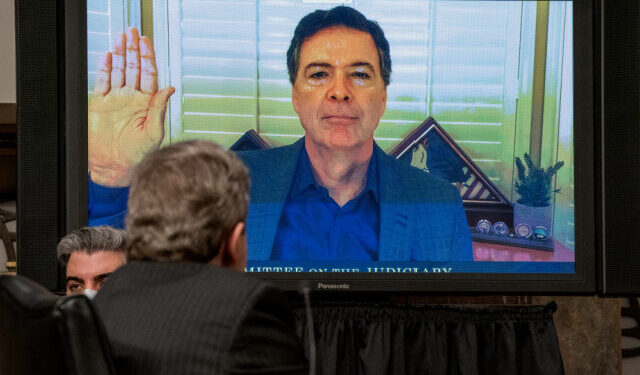Former FBI Director James Comey has now been indicted on one count of making false statements and one count of obstruction of justice. For years, many Americans have wondered if the high-ranking officials who fueled the chaos of the Trump years would ever be held accountable. This indictment marks a rare moment where the balance of power appears to tilt back toward equal justice.
The charges came just in time. After the Trump administration replaced the U.S. attorney for the Eastern District of Virginia, Erik Siebert, with White House aide Lindsey Halligan, the new prosecutor quickly sought an indictment before the statute of limitations expired next week. In a system where technical deadlines often allow the powerful to escape scrutiny, this move ensured that the matter would at least be tested in a court of law rather than buried in bureaucracy.
Attorney General Pam Bondi did not mince words. Without naming Comey directly, she wrote on X: “No one is above the law. Today’s indictment reflects this Department of Justice’s commitment to holding those who abuse positions of power accountable for misleading the American people. We will follow the facts in this case.” That statement is not just about one man—it’s about restoring trust in institutions that too often shield insiders from consequences.
The details of the case stretch back to testimony given before Congress. According to NBC News, the charges likely “stem from testimony Comey gave on Sept. 30, 2020, during a Senate Judiciary Committee hearing.” During that appearance, Sen. Ted Cruz, R-Texas, pressed him on earlier testimony from 2017 in which he had denied authorizing leaks tied to investigations into President Donald Trump or former Secretary of State Hillary Clinton. Comey doubled down, saying, “I stand by the testimony.”
But the record tells a different story. As NBC News noted, “Comey’s deputy, Andrew McCabe, has said that Comey authorized him to leak information to the press, according to a 2018 Justice Department inspector general’s report. But the report also found that McCabe made multiple false or misleading statements.” In other words, even within the highest ranks of the Bureau, there were conflicting accounts and a trail of evasions. For ordinary Americans, lying under oath has consequences. For public servants entrusted with immense power, it should matter even more.
The broader backdrop adds weight. Just this past July, the FBI launched an investigation into former CIA Director John Brennan and former FBI Director James Comey regarding their roles in the Trump-Russia probe that gripped the nation for years. That probe, built on shaky foundations and questionable tactics, divided the country and undermined confidence in democratic processes. The fact that figures like Comey are now facing scrutiny is a reminder of how corrosive unchecked authority can be when directed against political opponents.
This case is not merely about whether one man lied under oath. It is about whether America will allow a double standard in which powerful officials bend the truth with impunity while the public is expected to comply with every letter of the law. It is about whether government insiders remain unaccountable, or whether accountability will once again apply across the board.
For years, conservatives have called out bureaucratic overreach, secretive leaks, and politically motivated investigations that undermine both liberty and trust. The indictment of James Comey does not erase the damage already done, but it signals that the tide may finally be turning. Justice, after all, is not just for the governed—it must also reach the governors.




















